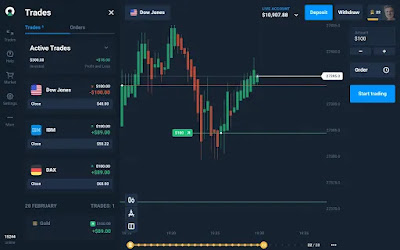Trading:
There are several advantages to online trading. First, it offers convenience, as investors can buy and sell securities from the comfort of their own homes or office. Second, it provides investors with greater control over their investments, as they can monitor their holdings in real-time and make trades at any time of day or night. Finally, online trading can be less expensive than traditional forms of trading, as investors can often access lower trading fees and commissions.
However, there are also risks associated with online trading. Investors may be more susceptible to fraud or scams, and may not have access to the same level of customer service and support that they would receive from a traditional broker. Additionally, online trading can be more volatile than traditional trading, as markets can move quickly and without warning.
Online trading is the process of buying and selling financial securities over the Internet, rather than through a physical broker or financial institution. The steps involved in online trading typically include:
Choosing a Broker:
The first step in online trading is to choose an online broker. An online broker is a financial company that provides a platform for investors to buy and sell securities. There are many online brokers to choose from, and it's important to research and compare them to find the one that best fits your needs.
Opening an Account:
Once you have chosen a broker, you will need to open an account with them. This typically involves filling out an online application and providing personal and financial information. The broker may also require you to provide proof of identity and address.
Funding the Account:
Once your account has been approved, you will need to fund it with money to start trading. Most online brokers offer several funding options, such as bank transfer, credit card, or PayPal.
Researching Investments:
Before making any trades, it's important to research potential investments. This may involve analyzing financial statements, reading news articles, or consulting with investment advisors. Many online brokers provide research tools and resources to help investors make informed decisions.
Placing Trades: Once you have identified an investment opportunity, you can place a trade through your online broker's platform. This typically involves selecting the security you wish to trade, specifying the amount you want to buy or sell, and setting a price limit.
Monitoring Performance: After making a trade, it's important to monitor the performance of your investments. This may involve tracking stock prices, reviewing financial reports, or consulting with investment advisors.
Closing Positions: When you are ready to sell your investments, you can do so through your online broker's platform. This typically involves selecting the security you wish to sell, specifying the amount you want to sell, and setting a price limit.
Overall, online trading provides investors with a convenient and cost-effective way to manage their investments. However, it's important to approach online trading with caution and to educate yourself about the risks involved. By researching potential investments, monitoring your portfolio, and working with a reputable online broker, you can increase your chances of success in online trading.







0 Comments